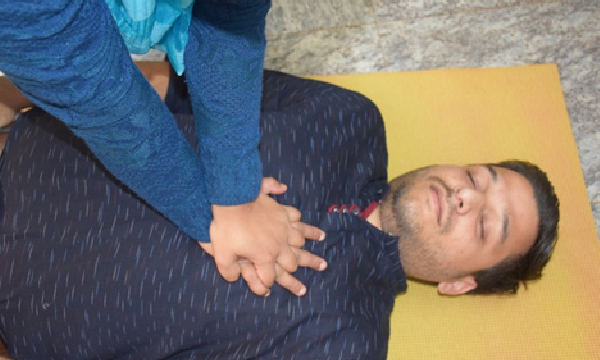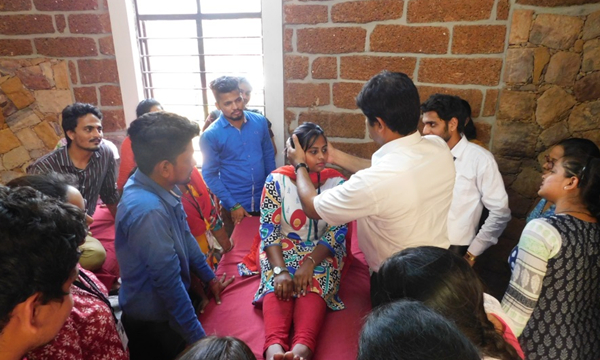Cardiac rehabilitation, commonly referred to as cardiac rehab, is a carefully designed outpatient exercise programme that educates the patient and their family members about the exercise programme. A heart attack, various types of heart disease, or having heart surgery can all be prevented with the aid of the rehabilitation programme.
Regaining strength, preventing the disease from growing worse, lowering the chance of developing future heart issues, and improving health and quality of life are the objectives of cardiac rehabilitation. Exercise programmes, emotional support, education on lifestyle changes, maintaining a healthy weight, and quitting smoking are all part of cardiac rehabilitation.
In intensive care units, cardiac rehabilitation can start as soon as feasible (but only if the patient's health is stable). The patient's state and problems during the acute stage of the disease determine the rehabilitation's intensity.
Patient Assessment Nutritional Counselling.
Weight Management Rehabilitation.
Psychosocial Management Rehabilitation.
Physical Activity Training.
Exercise Training.

PHASE 1 :- This phase starts as soon as the patient is admitted following a cardiovascular surgical operation. The evaluation of the patient's current state and motivation for rehabilitation come first.
PHASE 2 :- After the patient's condition has stabilised and she is ready to leave the hospital, this phase starts. She will continue her cardiac rehabilitation on a daily basis from home to the outpatient clinic. Though some may endure up to twelve weeks, it typically lasts three to six weeks. It aims to encourage independence and lifestyle adjustments to get patients ready to live at home again.
PHASE 3 :- This phase calls for more independence and self-awareness. It emphasises enhancing strength, flexibility, and aerobic conditioning.
Patients who have a history of heart illness or who are currently suffering from different types of heart disease might benefit from cardiac rehabilitation. The numerous heart conditions include:-
PHASE 1 :- Heart Attack.
PHASE 2 :- Coronary Artery Disease.
PHASE 3 :- Heart Failure.
PHASE 3 :- Peripheral Heart Disease.
PHASE 3 :- Chest Pain.
PHASE 3 :- Heart or Lung Transplant.
PHASE 3 :- Coronary Artery Bypass Surgery.
PHASE 3 :- Pulmonary Hypertension.
Helps in improvement of strength.
Helps in to adopt healthy habits , such as regular exercise and heart-healthy diet.
Helps in managing weight.
Helps in finding various ways to manage stress.
Helps in decrease the risk of coronary heart disease and other heart conditions.
Physiotherapists have a important role in cardiac rehabilitation when patient suffers from shoulder pain , back pain , neck pain due to medical history of heart disease. Physiotherapists helps in reducing pain and improve their range due to which patients able to do their daily activities independently.
Patients frequently present to cardiac rehabilitation with mobility and balance issues. A physiotherapist with training in movement analysis can spot balance and musculoskeletal problems by watching a person's walk. The physiotherapist can prescribe individually appropriate exercise, which may incorporate balance re-education or if necessary, provide a mobility assistance, which might result in less energy being used.
The same risk factors that apply to coronary heart disease also apply to stroke, which is classified as a cardiovascular disease. Beginning with safe participation, the exercises will eventually improve the patient's balance and coordination and enable him to carry out his daily tasks on his own.
Obesity is a separate risk factor for the emergence of coronary heart disease. This style of exercise combines walking as the primary exercise modality and eventually demands almost daily longer distance activities in order to optimise calorie expenditure. Overweight patients with heart disease entering cardiac rehabilitation should participate in a focused behavioural weight loss program that will shape their diet and exercise patterns.
It is commonly believed that diet is a major factor in the development of heart disease. The results of cardiovascular health and the reduction of cardiovascular disease morbidity and death are significantly influenced by proper diet. Reduced calorie intake and BMI can be achieved by individual nutritional counselling sessions of a typical educational programme, which may lower cardiovascular risk factors in cardiovascular patients.
The cardiovascular system is impacted by stress, anxiety, and depression through immunological, neuroendocrine, and behavioural pathways. It has been demonstrated that a low socioeconomic position, a lack of social support, stress at work and at home, anxiety disorders, and depression all raise the chance of developing certain cardiac diseases. Heart disease risk factors and depression are related. For instance, starting to smoke, smoking more frequently, and having a worse chance of stopping smoking are all linked to depression.

Margdarsi provide multimodal therapy under one roof.
A combination of mainstream functional therapies includes Speech -Language Therapy, Occupational Therapy, Behaviour Modification, Special Education, Care giving for functional independence.
Students knowledge, attitudes, and abilities to respond to community issues including poverty, low literacy, and inadequate rehabilitation resources are developed via Margdarsi.
Have Any Questions!! Call Us